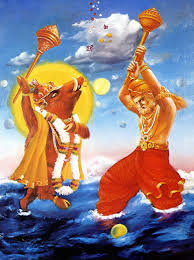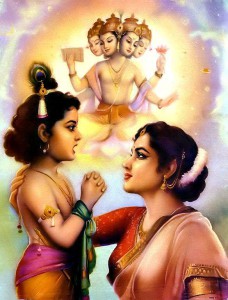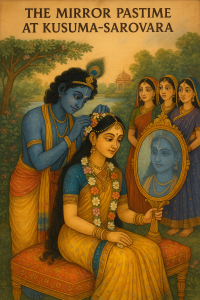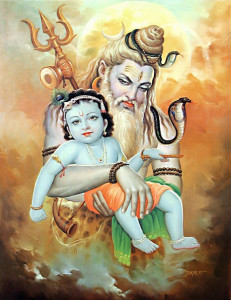By Madhu Chanda das
Introduction: Kṛṣṇa’s Playful Transformation
In the sacred land of Vṛndāvana, every moment is filled with the divine pastimes of Lord Kṛṣṇa and His eternal associates, the cowherd boys. One such playful and instructive pastime occurred near the tail end of Govardhana Hill, where two lakes, Apsarā Kuṇḍa and another, provide a serene setting for the divine play. On this particular day, the cowherd boys were preparing to engage in their usual wrestling matches, divided into two groups—one led by Balarāma, composed of the older boys, and the other led by Kṛṣṇa, with the younger boys.
The Wrestling Challenge and Kṛṣṇa’s Transformation
As the boys boisterously challenged each other, declaring their strength and superiority, Kṛṣṇa’s side faced mockery from Balarāma and the older boys. They teased Kṛṣṇa, doubting His strength and teasingly reminding Him of His playful nature. Unable to tolerate the ridicule, Kṛṣṇa, who is the Supreme Personality of Godhead, decided to teach them a lesson in a way only He could.
Kṛṣṇa’s playful anger manifested as He declared, “I am stronger than anyone in the universe, what to speak of any cowherd boy!” As the boys continued to mock Him, Kṛṣṇa’s anger grew, and His face flushed with a deep red. In that moment, Kṛṣṇa decided to reveal a form that would demonstrate His supreme power. Without any warning, He transformed into a gigantic, terrifying boar—His Varāha form.
Kṛṣṇa as Varāha: The Display of Supreme Strength
In His Varāha form, Kṛṣṇa stood as tall as the clouds, with massive, sharp tusks and powerful hooves. His dark complexion, resembling the color of a Tamal tree, contrasted with His glowing red eyes, which shone like rubies. The immense size and strength of this form shook the earth, causing the birds to fly away in fear and the animals to seek shelter.
Addressing the cowherd boys in a thunderous voice, Varāha-Kṛṣṇa declared, “So, you think I am weak? Watch as I lift the entire planet with My tusks!” As He spoke, Kṛṣṇa, in His Varāha form, began to dig His tusks into the dust of Vṛndāvana, attempting to lift the earth itself. The ground trembled under the immense power of the Lord, and the cowherd boys, who had been so confident just moments before, found themselves rolling helplessly as the earth shifted beneath them.
The Cowherd Boys’ Plea and Kṛṣṇa’s Mercy
Terrified and humbled by Kṛṣṇa’s display of strength, the cowherd boys cried out in fear, begging for mercy. “Kṛṣṇa, save us! Please forgive us for mocking You!” they pleaded. Despite their cries, Kṛṣṇa, still in His Varāha form, continued to lift the earth, causing the boys to panic even more. They turned to Balarāma, who, realizing the seriousness of the situation, instructed the boys to offer their apologies and surrender to Kṛṣṇa.
Following Balarāma’s lead, the boys fell to the ground and offered their obeisances to Kṛṣṇa, sincerely asking for forgiveness. Seeing their genuine remorse, Kṛṣṇa’s heart softened. He forgave them, reassumed His original form as a cowherd boy, and the earth settled back into its place. Kṛṣṇa smiled, dusted off His hands, and placed His flute back into His belt as if nothing extraordinary had happened.
Lessons Learned: Humility and the Power of Devotion
This pastime illustrates several important lessons for devotees:
- Humility Before the Divine: No matter how familiar or intimate we may feel with the Lord, we must always remember His supreme position and approach Him with humility and respect. The cowherd boys, though dear friends of Kṛṣṇa, learned that even playful ridicule must not cross the boundaries of reverence.
- Kṛṣṇa’s Infinite Power: Kṛṣṇa is not just a playful cowherd boy; He is the Supreme Personality of Godhead, capable of performing any miraculous feat. His Varāha form, which lifted the earth in His pastimes, was a reminder to the boys—and to all devotees—of His divine power and the need to approach Him with the proper understanding of His majesty.
- The Transformative Power of Kṛṣṇa’s Mercy: When the cowherd boys realized their mistake, they immediately surrendered to Kṛṣṇa and begged for His forgiveness. This act of surrender and the subsequent forgiveness they received from Kṛṣṇa highlights the transformative power of His mercy. No matter how grave our mistakes may be, if we sincerely repent and turn to Kṛṣṇa, He is always ready to forgive and accept us.
A Prayer for Devotion and Humility
O Lord Kṛṣṇa, who in Your Varāha form lifted the earth and saved the cowherd boys, please grant us the humility to always remember Your supreme position. May we approach You with hearts full of devotion, surrendering our pride and ego at Your lotus feet. Let us always remember that You are the Supreme Protector, and by Your mercy alone, we can be delivered from the challenges of this material world. Jai Śrī Kṛṣṇa! Jai Śrī Varāha Dev!
Quote from Śrīmad Bhāgavatam: “yadṛcchayā copagatāḥ svayaṁ narāḥ
sukham dadānāḥ śaraṇaṁ gatāḥ śrīyaḥ
kṛṣṇa-prasāda-bhāgavat-kripaṇeṣu yat
svārtheṣv adānta-manaso bhayād iva”
Translation: “Out of His causeless mercy, the Lord grants protection and satisfaction to all who surrender unto Him, regardless of their qualifications or lack thereof. Thus, those who are truly wise take shelter of Kṛṣṇa, abandoning all other forms of protection.”
This pastime beautifully encapsulates the essence of devotion, humility, and the boundless mercy of Lord Kṛṣṇa, reminding us to always remain humble and devoted, seeking His grace in all circumstances.



